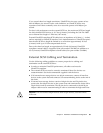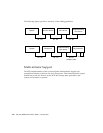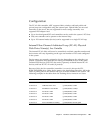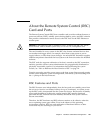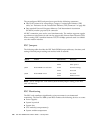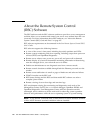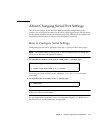
Chapter 4 Hardware and Software Configuration 107
About the Remote System Control (RSC)
Card and Ports
The Remote System Control (RSC) host controller card provides resident firmware, a
power-on self-test (POST), standby power, backup battery power, and RSC software
that provides simultaneous remote access to the RSC host via the RSC Ethernet or
modem ports.
Caution – The hardware card is installed in every system in the RSC slot. Never
move the RSC card to another system slot, as it is not a PCI-compatible card.
The card, installed in every system in the RSC slot, features on-board devices that
can monitor and trigger alerts, for example, about host system resets or power
supply failures, or other host system changes. An on-board RSC thermistor supplies
ambient temperature data about the host system to the firmware and to the installed
software.
The RSC card also supports redirection of its host’s console to the RSC connection,
and thus provides remote system administration for geographically distributed or
physically inaccessible systems. For information about redirecting the system
console, see “How to Redirect the Host Console to RSC” on page 111.
Console access also provides secure access to the host system firmware and permits
remote system diagnosis, system reconfiguration, and remote system rebooting from
the
ok prompt in the host firmware.
RSC Features and Ports
The RSC firmware runs independently from the host, and uses standby power from
the server (or from its own battery backup for up to 30 minutes). At system power
up the RSC card is incorporated into the system device tree. But, because of standby
power and the ability to redirect the system console, RSC remains functional
(provided the RSC software has been installed) should the host system software
become unavailable.
Therefore, the RSC hardware and RSC software continue to be effective when the
server operating system goes offline. Even in the absence of the operating
environment software, RSC can send notification of hardware failures or other
events that may be occurring on your server.



